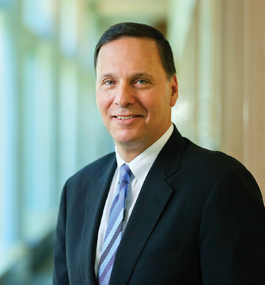From the President
Optimism After a Year of Challenges

Mike Lovett
President Ronald D. Liebowitz
Though our departure from campus more than 12 months ago in the face of the growing COVID-19 pandemic was hasty and unanticipated, it also presaged a great deal about the year ahead. Brandeis (and the world) would constantly need to adapt, improvise, and reimagine. Our academic mission, combined with our commitment to social justice, would guide our decision making. Through it all, we would continue to foster community, intellectual curiosity, and activism.
It has been an unspeakably challenging year — both in terms of the lives lost and the health crisis’s economic impact on the most vulnerable. But I also see cause for optimism in the way the Brandeis community responded, particularly in our work together to “repair the world.”
I draw particular inspiration from this year’s Rosenstiel Award winners, Katalin Karikó and Drew Weissman ’81, MA’81, P’15. These two scientists pioneered much of the basic research underlying the COVID-19 vaccines developed by Pfizer/BioNTech and Moderna, now being administered worldwide. Their scientific discoveries tied to messenger RNA (mRNA) created the basis for the first vaccines authorized for use in the United States — work that was done in less than a year, resulting in vaccines that offer an unprecedented 95% efficacy rate.
Karikó and Weissman’s research offers hope — and proof — that science holds the power to rescue us from calamity. Equally important, it reminds us why Brandeis works so hard to nurture inquiry in students across all disciplines. Although mRNA was widely recognized and understood, it was little studied when Karikó and Weissman began investigating its use in therapeutics. Basic scientists know well that predicting the value of early discoveries can be difficult. But only by probing a multitude of questions and possible answers can we discover pathways to addressing our most complex issues of health, economics, social justice, and equity.
Closer to home, Brandeisians rediscovered the power of personal choice and commitment to community. To maintain a safe campus environment, the university to date has conducted more than 135,000 COVID-19 tests. Our positivity rate has remained exceptionally low, a testament to our shared sense of responsibility to stopping the spread and our confidence in using science-based health policies to guide our individual and collective actions. I am so grateful our students, staff, and faculty have stood together to create a viable learning community at a time when it is so clearly needed.
Brandeis alumni, parents, and friends have been with us every step of the way. On Giving Tuesday — or Giving DEISday — more than 2,700 Brandeis supporters pitched in more than $1.1 million to benefit scholarships, teaching, and extracurricular programs.
The resilience, tenacity, and creativity the Brandeis community has shown during the pandemic has me incredibly optimistic for the future. We have spent a year apart in so many ways, yet I feel as though we are more united than ever in our sense of common purpose and values. We have proven it is possible to both reshape and strengthen all aspects of our shared intellectual, social, and academic enterprise. We will continue to do so in search of a world that is more equitable, sustainable, and prosperous. Thank you for being our partner in this journey.
Best regards,
Ronald D. Liebowitz
